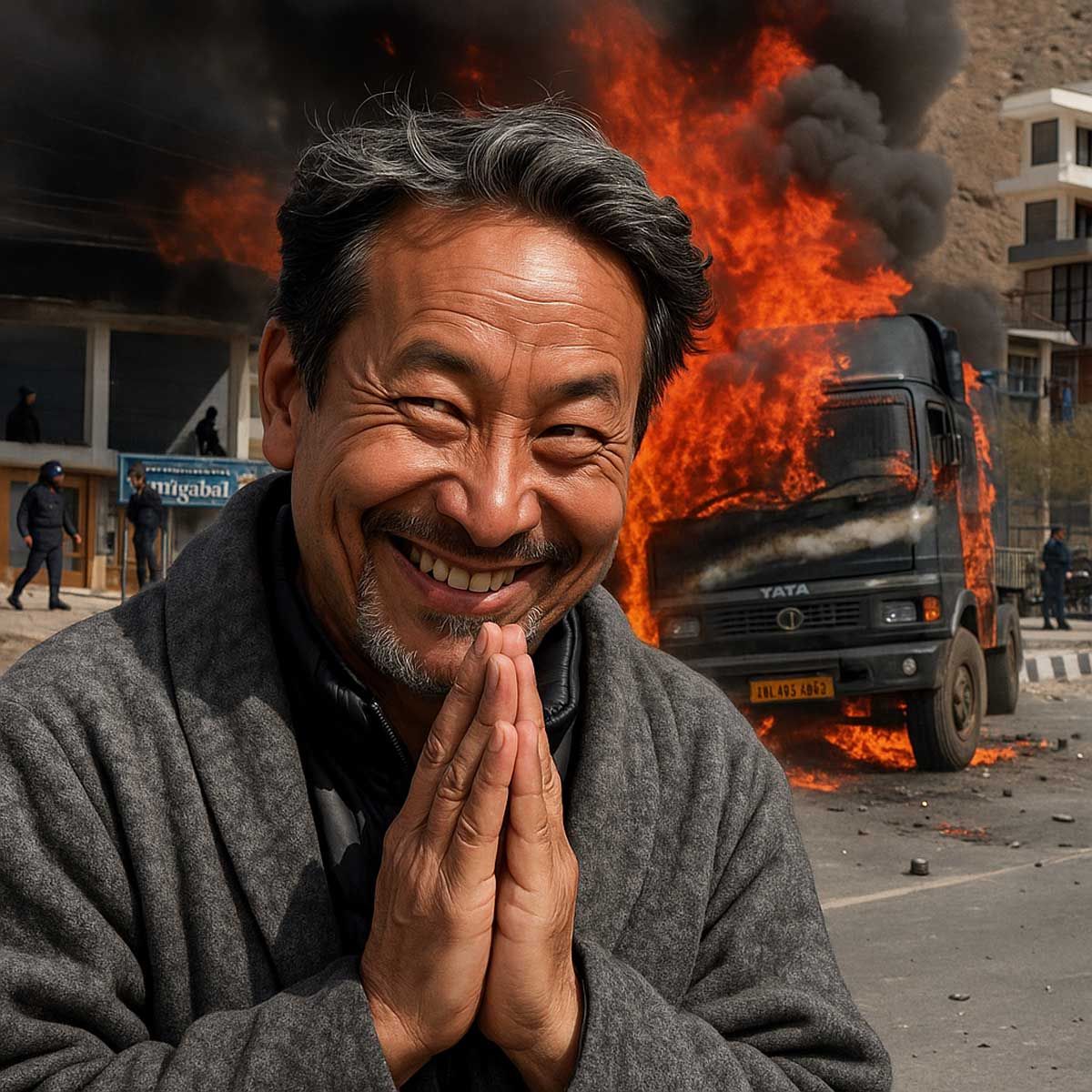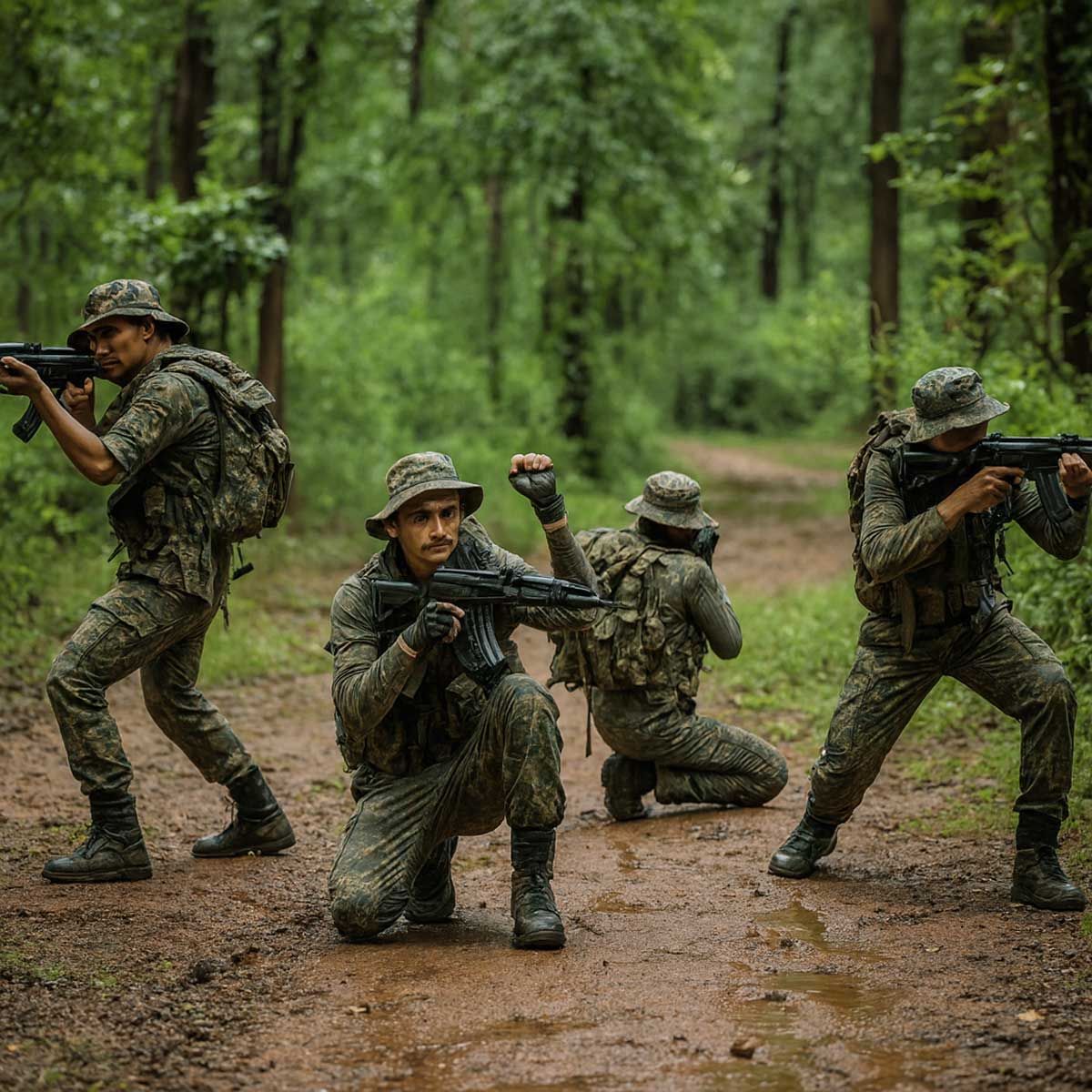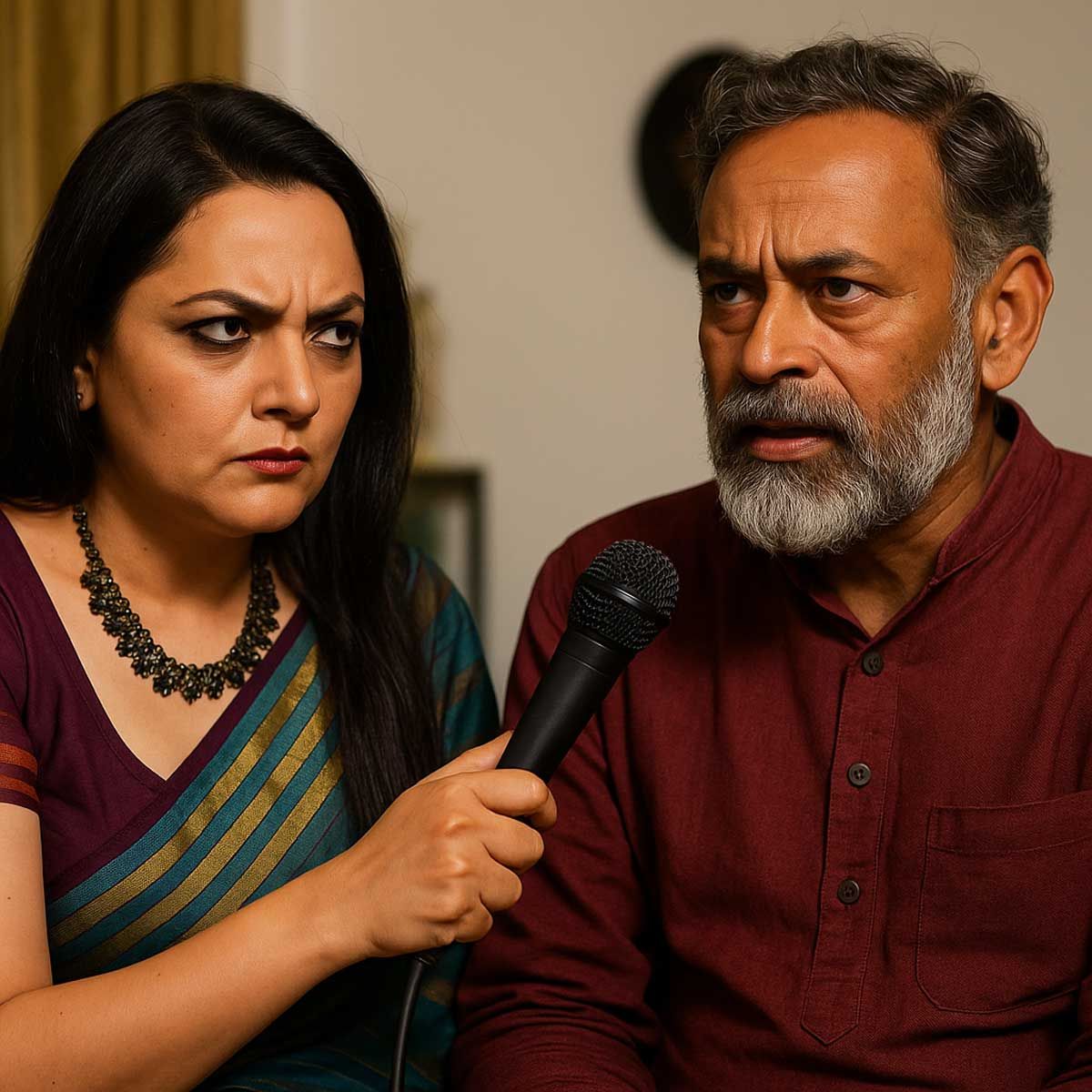More Coverage
Twitter Coverage
Satyaagrah
Written on
Satyaagrah
Written on
Satyaagrah
Written on
Satyaagrah
Written on
Satyaagrah
Written on
JOIN SATYAAGRAH SOCIAL MEDIA
Exposed: Nitasha Kaul's ban from India, justified by her deep ties with anti-India groups & spreading venom, from testifying against India in US Congress to associating with extremist organizations, her actions reveal an agenda far from scholarly debate

On February 25th, Nitasha Kaul, a British academic and writer known for her outspoken views, found herself at the center of a contentious episode upon her arrival at Bengaluru Airport. Kaul, who lives in London, faced immediate deportation under circumstances that remain murky, described only as "unknown reasons." This event took a dramatic turn given that it was the Congress-led government of Karnataka that had extended an invitation to her to speak at the 'Constitution and National Unity Convention.'
Kaul's response to being barred from entry was to take to social media, where she vocally expressed her dismay. According to her account, immigration officials detained her, stating they were following "orders from Delhi" that explicitly prohibited her from entering India. Despite claiming to have all the required documents for her visit, Kaul depicted herself as a victim of an unwarranted and challenging predicament. She boldly declared her intention to persist in championing "democracy and civil liberties" in spite of the "adversities faced." Her social media posts were peppered with criticisms directed at the "right-wing" and "Hindutva," indicative of her stance against the current Indian political climate.
Furthermore, Kaul positioned herself alongside historical figures of resistance by stating, "The government at the centre in India refused me entry to a conference where the state government invited me. Unless this is fixed, I join the ranks of the Tibetan exiles and Ukrainian exiles and others throughout history who have faced the arbitrary exercise of brute unreasoning power." This comparison, however, raises eyebrows for its dramatic equivalence to the plight of actual exiles, who have endured far greater trials and tribulations. Her assertion reflects a deep-seated bias and an inclination towards anti-India propaganda, as it seemingly overlooks the complexities and nuances of India's political decisions and its implications on national security and sovereignty.
Kaul's narrative, though framed as a defense of democratic values and civil liberties, fails to acknowledge the legitimate concerns that might underlie the Indian government's decision to deny her entry. By focusing her critique solely on ideological differences and labeling the government's actions as unjust without a thorough understanding or consideration of the reasons behind them, Kaul's approach can be seen as one-sided and lacking in a comprehensive analysis of the situation. Her swift alignment with the narrative of oppression and exile, without acknowledging the broader context of her own activities and their impact, further complicates the discourse around freedom of speech and political dissent in India.
|
Nitasha Kaul, amidst the controversy of her denied entry into India, suggests that the Indian government should initiate a dialogue with her. She reaches out to academicians and media professionals to explore her work, highlighting its importance to discussions on democracy and global politics. Despite facing what she describes as a "harrowing ordeal" and "intimidation," Kaul asserts that these experiences have only emboldened her dedication to advocating for democratic principles.
In her critique of the government's decision to bar her from attending a conference, Kaul poses challenging questions: "How can the world's largest democracy be threatened by my pen & the word? How is it ok for the center to not allow a professor to be at a conference on the Constitution where she was invited by the state govt? To give no reason? Not the India we cherish, is it?" Through these questions, she condemns the lack of justification provided for her deportation and questions the threat her intellectual contributions supposedly pose to the Indian democracy.
However, Kaul's stance has been met with skepticism, particularly given her past controversial remarks about India's internal policies, notably her criticism following the abrogation of Article 370 in Kashmir in 2019. Such comments have led to scrutiny over her intentions and the potential negative influence she might have had at the conference, especially one backed by the Karnataka government. The support she has received from the left-liberal segments on social media does not mitigate concerns about her anti-India rhetoric, which has been characterized by some as objectionable. This backdrop of contentious statements sheds light on the broader debate about the impact of her academic and public engagements on India's image and internal affairs.
Kaul’s Controversial Remarks at the US House Foreign Affairs Committee in 2019
In her 2019 testimony before the US House Foreign Affairs Committee on South Asia Human Rights, Nitasha Kaul presented a critical view on Kashmir, accusing it of being in a state of “humanitarian crisis” largely due to the Indian government's policies. She controversially attributed the displacement of Kashmiri Pandits to the Indian state, overlooking the violence by terrorists that led to their mass migration.
Kaul argued, "Indian state which has claimed sovereignty over Jammu and Kashmir singularly failed to protect the minorities while suppressing the majority. The denial of democratic rights in Indian-Administered Kashmir affects not only the residents but also those living outside in India and overseas." This commentary simplifies the intricate challenges in Kashmir, placing the blame squarely on the Indian government without acknowledging the complex history of insurgency and terrorism that also affects the region's dynamics.
In her submission, she specifically termed the region “India Administered Kashmir,” implying it is not an integral part of India, a viewpoint that contradicts India's legal and historical claims. Her critique extended to the electoral process in Kashmir with a detailed observation: “Elections in Indian Administered Kashmir are deeply divisive with many people boycotting it since electoral participation is represented as the consent of Kashmiris to being ruled by India and thus making redundant the promise of the referendum that India and Pakistan made through United Nations Resolutions of 1947 and 1948. However, some Kashmiris do participate in elections since they believe in working within the Indian system. Even those pro-India leaders are now under indefinite arrest. This illustrates that the Indian government is fully aware of the erasure of autonomous statehood as being deeply unpopular, and thus, its action lacks democratic consent. To repeat, an imposition of a landmark change in governance while keeping the entire population locked is a sign of authoritarianism and not democracy.”
Her statements challenge the democratic integrity of India's governance in Kashmir, suggesting a forced compliance from the population rather than a genuine consensus. Kaul's narrative, focusing on the alleged authoritarianism of the Indian government in handling Kashmir's political landscape, neglects the broader security concerns and efforts to integrate the region while combating terrorism and insurgency. This perspective has sparked debate over the objectivity and fairness of her analysis, given the omission of the violent separatism and external aggression that have also shaped Kashmir's recent history.
In her statements, Nitasha Kaul criticized the Indian government, likening its actions in Kashmir to those of a "colonial power" and accused the ruling Bharatiya Janata Party (BJP) of silencing dissenting voices within the region. She advanced a narrative that in India, particularly under the current administration, Muslims and Christians are unfairly targeted and discriminated against.
She asserted, "Muslim and Christian minorities are seen as enemies and obstacles in the agenda. Various rights organisations, scholars and news commentators have highlighted the spike in everyday discrimination, prejudices and violence that religious minorities have to endure. The primary focus is on demonising and marginalising the largest religious minority – Muslims. Several Muslims have been lynched, and instead of calling for the punishing of the culprits, members of the ruling party have justified the acts and sometimes valorised the culprits."
Karnataka BJP criticises Congress for inviting Kaul
The BJP in Karnataka has launched a scathing attack on the Congress party and Chief Minister Siddaramaiah for extending an invitation to Nitasha Kaul. They accuse the Congress of tarnishing the Indian Constitution by involving someone they describe as a "Pakistani sympathiser who wants India’s breakup." The criticism was voiced through a message on X, where BJP Karnataka expressed their dismay, "Congress party has disgraced Indian Constitution by inviting a Pakistani sympathiser who wants India’s break up. Don’t you have any shame left, CM Siddaramaiah? Are you trying to challenge the Constitution & threaten the unity & integrity of India? It is now apparent that the Congress party is now using Karnataka as its laboratory to prepare the ground for its divisive agendas, potentially undermining national unity & integrity."
They continued to criticize the Congress government in Karnataka for what they see as misuse of state resources. "At the expense of Karnataka taxpayers, the Congress govt is channelling funds to terrorist sympathisers, Urban Naxals, Anti-Nationals, and riots accused of destabilising India ahead of elections. Thanks to our security agencies, one such anti-India element was caught suspiciously entering India & detained at the airport. There is no money to spend on drought relief or Karnataka’s developmental needs. Still, Siddaramaiah is happy to finance the Break India Brigade to appease Rahul Gandhi and save his CM Chair, all in the name of Dr. Ambedkar’s Constitution. What a disgrace! #AntiNationalCongress," they added, indicating a strong condemnation of the Congress party's actions, which they believe are divisive and threaten national integrity.
Who is Nitasha Kaul?
Nitasha Kaul is an individual whose professional life encompasses a broad range of roles including being an academic, author, and economist. Her work critically examines politics, economics, and cultures, with a particular focus on the region of Kashmir. She holds views that have often been seen as contentious, especially in relation to the Indian Central Government.
Based in London, Kaul is a British writer, poet, and academic recognized for her contributions to various fields. She is actively involved in writing fiction and delivering lectures on a wide array of topics such as political economy, gender and identity, Bhutan, Kashmir, and the concept of nationalism within India. Her background is rooted in Gorakhpur, Uttar Pradesh, but she was brought up in Delhi and comes from a Kashmiri Pandit family. Her current academic position is that of an Associate Professor in Politics and International Relations at the University of Westminster.
Kaul's academic pursuits are diverse, with a particular interest in exploring feminist perspectives concerning Kashmiri women, the emergence of strong neo-liberal nationalism in India, and a critical examination of right-wing politics in the country. On October 22, 2019, she was one of the main witnesses at a hearing conducted by the United States House Committee on Foreign Affairs. This hearing was focused on the human rights scenario in Kashmir in the wake of the repeal of Article 370, highlighting her significant involvement in discussions about the region.
|
Unveiling the Controversy: Nitasha Kaul's Ban from India and exposing her hidden Agendas
The ban on Nitasha Kaul's entry into India, orchestrated just before an election, is enveloped in controversy and suspicion. This drastic measure wasn't merely procedural but a pointed response to her history of provocative actions and associations deemed anti-India. Kaul, a figure who has consistently critiqued India's stance on Kashmir at international forums like the U.S. Congress, finds herself at the center of a storm for her connections with organizations and activities that challenge India's sovereignty and democratic fabric.
Her marriage to Dibyesh Anand, a vocal critic of Indian policies, further complicates her narrative, intertwining personal and political realms. Anand, known for his stance on gay rights and critical viewpoints on India, including his remarks on the Citizenship Amendment Act (CAA), aligns closely with Kaul's critical posture towards Indian governance and its policies in Kashmir.
Kaul's attempt to enter India, particularly at a politically sensitive time, is not seen as coincidental but as a deliberate move to fuel dissent and leverage her international platform to undermine India's constitutional amendments, specifically the abrogation of Article 370. Her affiliations with groups like the South Asia Solidarity Group, known for their anti-India rhetoric, and participation in events that openly challenge Indian policies, underscore the perceived threat she poses to national unity and public order.
This ban, therefore, is not merely about an individual's denied entry but signifies a broader stance against voices that actively participate in discrediting India's sovereign decisions and internal matters on global stages. It highlights a critical examination of intentions and allegiances of those who seek to engage with India's democratic processes and societal debates.
|
Nitasha Kaul and her spouse marked their presence at an event orchestrated by the Asian American Resource Workshop (AARW), an organization founded by Fred Ho, a proponent of Mao-inspired communism. AARW's long-standing collaboration with the CCP-funded CPA underscores a troubling alliance.
Kaul, intending to discuss democratic and constitutional values in Bengaluru, has been recurrently associated with several organizations promoting anti-India narratives on Kashmir, such as 'Stand with Kashmir' (SWK) and 'Kashmir Solidarity Movement' (KSM). Her involvement is so pronounced that she even appears in the SWK educational materials.
The couple's participation in an event hosted by the controversial Indian American Muslim Council (IAMC) and the Sunita Viswanath-led Hindus for Human Rights (HfHR) further illuminates their alignment with groups critical of Indian democracy and Hindu nationalism.
Kaul's interaction with Arfa Khanum Sherwani, known for her extremist and propagandist journalism, adds another layer to this intricate web of affiliations. Their discussions on Kashmir, gender, and identity, alongside their meeting in Chicago at the Parliament of the World's Religions, reveal a concerted effort to amplify their contentious narratives.
Her visit to Pakistan, where she openly criticized India's democratic integrity at the Lahore Literary Festival alongside figures like Audrey Truschke, demonstrates a blatant disregard for India's sovereignty. Kaul's engagements with individuals and organizations known for their anti-India stance, including connections with ISI affiliates like Muzzammil Ayyub Thakur, signal a deep-rooted agenda against Indian interests, highlighting her extensive involvement in activities and groups that seek to undermine India's national unity and democratic framework.
Platforms known for their critical stance towards India, such as The Wire and The Caravan, have frequently provided Nitasha Kaul with a space to express views that are seen as hostile towards India. Her extensive record of portraying India negatively on international platforms offers a clear context for her being denied entry into the country. This denial of entry comes in light of an incident where Dr. Gautam Sen had once mistakenly identified her as a representative of the Pakistan embassy, further underscoring the controversies surrounding her identity and affiliations.
 Support Us
Support Us
Satyagraha was born from the heart of our land, with an undying aim to unveil the true essence of Bharat. It seeks to illuminate the hidden tales of our valiant freedom fighters and the rich chronicles that haven't yet sung their complete melody in the mainstream.
While platforms like NDTV and 'The Wire' effortlessly garner funds under the banner of safeguarding democracy, we at Satyagraha walk a different path. Our strength and resonance come from you. In this journey to weave a stronger Bharat, every little contribution amplifies our voice. Let's come together, contribute as you can, and champion the true spirit of our nation.
 |  |  |
| ICICI Bank of Satyaagrah | Razorpay Bank of Satyaagrah | PayPal Bank of Satyaagrah - For International Payments |
If all above doesn't work, then try the LINK below:
Please share the article on other platforms
DISCLAIMER: The author is solely responsible for the views expressed in this article. The author carries the responsibility for citing and/or licensing of images utilized within the text. The website also frequently uses non-commercial images for representational purposes only in line with the article. We are not responsible for the authenticity of such images. If some images have a copyright issue, we request the person/entity to contact us at This email address is being protected from spambots. You need JavaScript enabled to view it. and we will take the necessary actions to resolve the issue.
Related Articles
- New York Times looks for anti-Hindu, anti-Modi candidates to spread propaganda: Dissecting the dangerous job opening
- "Manipulating minds, one tweet at a time": China cunningly exploits global social media, manipulating opinions through a web of deceit, Oxford Internet Institute exposesunchecked cyber onslaught, revealing China's ambitions to control global narratives
- Here is a list of 20 incidents where the ‘Jai Shri Ram’ slogan has been misused to turn a random crime into ‘hate crime’
- Fahad Shah, editor of the prominent Srinagar-based news portal 'The Kashmir Walla' arrested for anti-national activities and sharing provocative content on the social media platform
- "बँटवारा": Arfa Khanum Sherwani calls for Sir Syed Ahmed Khan’s leadership, sparking controversy as Khan, founder of AMU and proponent of the Two Nation Theory, fueled the Hindu-Muslim divide with Islamists aiming to make India an Islamic nation by 2047
- Anti-Hindu Delhi Riots case: Delhi HC grants bail to accused Asif Iqbal Tanha, Devangana Kalita, Natasha Narwal
- Adani battles Subramanian Swamy's nefarious and disgusting attempts to link them to Uttarkashi tunnel collapse, claim that was started by propaganda site The Wire, Adani Group slams condemnation, the truth stands tall – no involvement, no compromise
- Terrorist Organization SFJ chief Pannu threatens PM Modi and India after the security breach, says ‘Tiranga wale fled from Punjab’
- On 2 years of anti-CAA violence, frustrated Arundhati demands ‘PM should be only for 5 years’ at Jamia event
- "Sarfaroshi ki tamanna ab hamare dil me hai, dekhna hai zor kitna baazu-e-Amnesty me hai": ED alleged Amnesty India is ‘kingpin’ of Breaking India forces, routed Rs 51 crore violationing FCRA to “fund anti-national activities in guise of export of service
- Ministry of External Affairs summons South Korea Ambassador over the pro-terror stance of Hyundai Pakistan on Kashmir and expressed strong displeasure of the Government: Korean Minister Yong exhibit regret
- "जालसाज": ABC News 'journalist' Avani Dias, known for her visa cancellation fiction drama, now misrepresents India's Constitution, falsely claiming 'secular' was included in 1947, though it was Indira Gandhi who added it in 1976 amidst her emergency-era
- ‘State in denial, admin lied about no complaints being filed, prima facie evidence of violence’: Everything Calcutta HC said on Bengal post-poll violence
- X freezes IAMC & HfHR accounts over Anti-India claims, let's delve deep to uncover HfHR & IAMC's covert anti-Hindu motives, exposing their strategic efforts to malign Hinduism, their narratives highlight a concealed bias against India's diverse spirit
- "Traitors wear many masks but have only one face": J&K Bank's Chief manager, Sajad Ahmad Bazaz, sacked for shadowy ISI links, manipulating media with bank funds, and ties to extremist leaders, was planted for advancing the extremist-separatist ideology





























